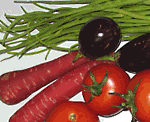Vegetable Nutrition Facts
 |
 |
Why should we get diet rich in vegetable nutrition?
What are the health benefits of vegetables?
Well!
-
Vegetables, like fruits, are low in fat but contain good amounts of vitamins and minerals. All the Green-Yellow-Orange vegetables are rich sources of calcium, magnesium, potassium, iron, beta-carotene, vitamin B-complex, vitamin-C, vitamin A, and vitamin K.
-
As in fruits, vegetables too are home for many antioxidants that; firstly, help protect the human body from oxidant stress, diseases and cancers, and secondly; help the body develop the capacity to fight against these by boosting immunity.
-
Additionally, vegetables are packed with soluble as well as insoluble dietary fiber known as non-starch polysaccharides (NSP) such as cellulose, mucilage, hemi-cellulose, gums, pectin...etc. These substances absorb excess water in the colon, retain a good amount of moisture in the fecal matter, and help its smooth passage out of the body. Thus, sufficient fiber offers protection from conditions like hemorrhoids, colon cancer, chronic constipation, and rectal fissures.
...Go for greens to help you stay fit and healthy!
Vegetable nutrition has widely drawn the attention of fitness conscious as well as food scientists alike for their proven health benefits. Majority of day to day used vegetables are very low in calories. Celery is just 16 calories per 100 g. And again here is the long list of vegetables whose calorie is less than 20 per 100 g such as bottle gourd, bitter melon, cabbage, chinese cabbage, bok-choy, eggplant, endive, spinach, summer squash, swiss chard; etc. Scientific studies have shown that low-calorie but nutrient-rich foods help the human body stay fit and disease free.
Furthermore, human body spends a considerable amount of energy for the metabolism of foods, which is known as BMR or Basal metabolism rate. So just imagine…when you add lots of vegetable nutrition in the diet, in fact, you set to lose more weight than you would gain…Right!..This is the concept behind the "negative calorie foods."
Here is an impressive list of vegetables along with their nutrition facts and health benefits:
How much vegetables should be in our daily diet?
Eat at least 5-7 servings of fresh vegetables every day. Federal dietary guidelines now recommends at least 9 servings of vegetable and fruits per day. Seasonal vegetables should be encouraged. Bring a variety in the choice of vegetable and color in your diet. Yellow and orange color vegetables are rich in Vitamin A, α, β carotenes, zea-xanthins and crypto-xanthins, where as dark-green vegetables are a very good source of minerals and phenolic, flavonoid as well as anthocyanin anti-oxidants.
Selection of vegetables
Whenever possible, go for organic farm vegetables to get maximum health benefits. They are not very expensive if you can find them from the nearby local farm owners. Organic verities tend to be smaller but have rich flavor, possess some good concentration of vitamins, minerals and loaded with numerous health benefiting anti-oxidants.
-
In the markets, however, always buy small quantities so that they should last within a day or two. There is no point in eating unfit greens!
-
Buy that feature freshness, bright in color and flavor and feel heavy in your hands.
-
Look carefully for blemishes, spots, fungal mold and signs of insecticide spray. Buy whole vegetables instead of section of them (for example, pumpkin).
How to use vegetables?
First thing- you need to do immediately after shopping, wash them, especially green leafy vegetables. Rinse in salt water for few minutes and gently swish in cool water until you are satisfied with cleanliness. This way, you ensure they are free from dust, sand and any residual chemical sprays. Use them early while fresh because,firstly, certain vegetables have very short shelf life and secondly, the health benefiting properties of a vegetable declines with time. However, if you need to store them, then place in plastic wrappings or in zip pouches in order to preserve nutrition for short-periods until you use them.

 Artichoke
Artichoke Arugula
Arugula Asparagus
Asparagus Bamboo shoots
Bamboo shoots Basella
Basella  Beets
Beets Bell pepper
Bell pepper Bitter gourd
Bitter gourd Bok choy
Bok choy Broccoli
Broccoli Brussel sprouts
Brussel sprouts Butternut squash
Butternut squash Cabbage
Cabbage Carrots
Carrots Cassava
Cassava Cauliflower
Cauliflower Collard greens
Collard greens
 Eggplant
Eggplant Endive
Endive Fennel
Fennel Fiddlehead ferns
Fiddlehead ferns Green Beans
Green Beans Jicama
Jicama Kale
Kale
 Leeks
Leeks
 Lotus root
Lotus root Moringa pods
Moringa pods Mustard greens
Mustard greens Okra
Okra Onion
Onion Parsnips
Parsnips Peas
Peas
 Pumpkin
Pumpkin Purslane
Purslane Radicchio
Radicchio Radish
Radish Rhubarb
Rhubarb Shallots
Shallots
 Sweet corn
Sweet corn
 Swiss chard
Swiss chard Tomato
Tomato Turnips
Turnips Watercress
Watercress Winged Bean
Winged Bean Yams
Yams Zucchini
Zucchini

